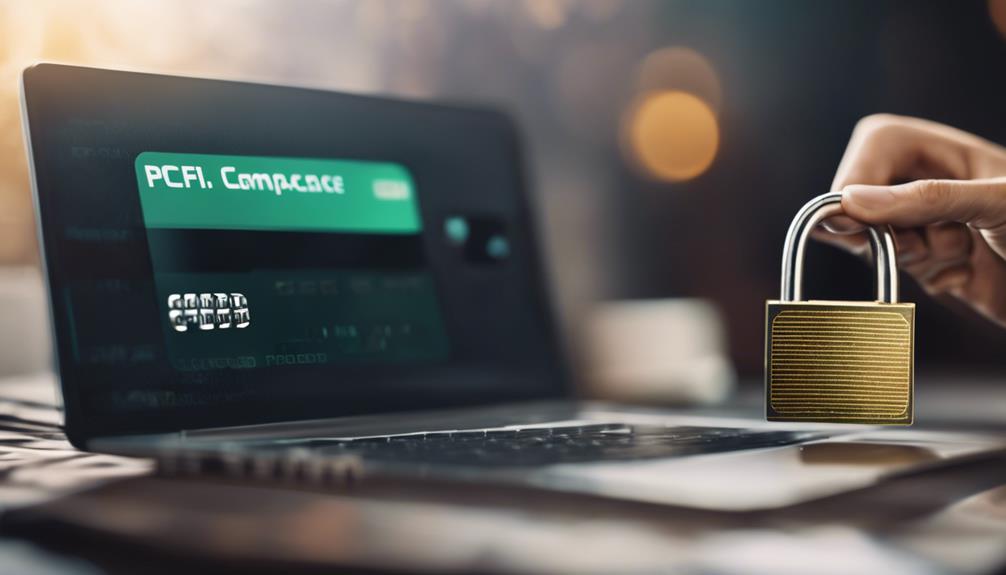Harnessing the power of PCI compliance boosts your business's security, customer trust, and operational efficiency. It underscores your dedication to protecting sensitive data in the payment ecosystem. By adhering to PCI standards, you enhance your brand's reputation and reduce the risk of breaches. Compliance levels (1-4) vary based on transaction volume, with corresponding validation forms. Assessments like ROC, AOC, and SAQ guarantee compliance, while vulnerability scans and penetration testing identify and address security weaknesses. Non-compliance can lead to fines, loss of trust, and data breaches. Prioritize PCI to safeguard your business's reputation and financial stability. Embrace PCI compliance for robust security and risk mitigation.
Key Takeaways
- Enhances security posture and customer trust.
- Lowers breach risk, improving brand reputation.
- Boosts operational efficiency for smoother transactions.
- Demonstrates commitment to safeguarding data.
- Contributes to a more secure payment ecosystem.
Benefits of PCI Compliance

Improve your business's security posture and customer trust by achieving PCI compliance. By adhering to PCI standards, you greatly lower the risk of breaches, enhancing both your customer experience and brand reputation.
Operating within the guidelines of PCI compliance boosts your operational efficiency, ensuring smoother transactions and customer interactions. Additionally, meeting PCI requirements demonstrates your commitment to safeguarding sensitive data, instilling confidence in your customers.
Enhancing your security measures through PCI compliance not only protects your business but also contributes to a more secure payment ecosystem overall. By reaping the benefits of PCI compliance, you not only mitigate risks but also position your business as a trustworthy and reliable entity in the eyes of your customers.
Compliance Levels and Requirements

With varying levels based on transaction volume, understanding PCI compliance requirements is essential for businesses processing card payments. The four levels – 1 to 4 – determine the validation forms needed for compliance. Below is a breakdown of the compliance levels and their respective requirements:
| Compliance Level | Transaction Volume | Validation Forms Required |
|---|---|---|
| Level 1 | > 6 million/year | ROC, AOC, Quarterly Scans |
| Level 2 | 1 to 6 million/year | SAQ D, Quarterly Scans |
| Level 3 | 20,000 to 1 million/year | SAQ C, Quarterly Scans |
| Level 4 | < 20,000/year | SAQ A, Quarterly Scans |
Understanding which level your business falls under is essential for meeting PCI compliance standards.
Validation Assessments for PCI

To ensure your business maintains PCI compliance, understanding the various validation assessments required is vital in meeting the necessary standards. These assessments include the Report on Compliance (ROC) for level 1 merchants, Attestation of Compliance (AOC) for levels 2-4, PCI Self-Assessment Questionnaire (SAQ) for smaller merchants, vulnerability scans, and penetration testing.
The ROC provides a thorough review of controls, while the AOC is a declaration of compliance. The SAQ streamlines the process for merchants with lower transaction volumes. Vulnerability scans identify potential weaknesses, and penetration testing evaluates the effectiveness of security measures.
Understanding the purpose and frequency of each assessment is essential for ensuring your business remains compliant with PCI standards.
Penalties of Non-Compliance

Facing non-compliance with PCI standards carries significant consequences that can impact your business's reputation and financial stability. Failure to adhere to PCI standards may result in potential fines and penalties imposed by major credit card brands.
Non-compliant merchants risk losing the trust of their customers, leading to a decline in sales and long-term damage to their brand image. Additionally, data breaches resulting from non-compliance can lead to costly investigations, lawsuits, and damage control efforts.
It's imperative to prioritize PCI compliance to avoid these penalties and safeguard your business against the detrimental effects of non-compliance. Take proactive measures to ensure that your business meets the necessary requirements to protect both your customers and your bottom line.
Preparing for PCI DSS V4.0

Prepare yourself for the upcoming implementation of PCI DSS v4.0 by understanding its focus on security and the necessary measures for a successful adaptation. This new version emphasizes enhancing payment security, emphasizing a risk-based approach, and promoting a proactive cybersecurity strategy.
To get ready for v4.0, make sure you stay updated on the latest requirements, conduct thorough risk assessments, and implement robust security controls. Familiarize yourself with the changes from v3.2.1 to v4.0 to streamline the adjustment process. Engage with stakeholders, such as IT teams and compliance officers, to align on the implementation strategy.
Frequently Asked Questions
How Can Small Businesses Afford PCI Compliance?
Affording PCI compliance as a small business involves evaluating security measures. Start by analyzing your current processes and identifying areas that need improvement.
Utilize cost-effective solutions like outsourcing compliance tasks or investing in affordable software. Implement best practices to reduce the risk of data breaches. Remember that non-compliance can lead to hefty fines and damage your reputation.
Protect your business and your customers by making security a top priority.
What Are the Consequences of Failing a PCI Audit?
Failing a PCI audit can result in severe consequences for your business. Non-compliance may lead to hefty fines imposed by major credit card brands and damage your reputation.
Additionally, you risk data breaches that could compromise sensitive customer information. It's important to prioritize PCI compliance to safeguard your business from these risks and maintain trust with your customers.
Take the necessary steps to address any audit failures promptly.
Is PCI Compliance Mandatory for All Businesses?
PCI compliance is mandatory for all businesses that handle credit card transactions. It guarantees the security of cardholder data and reduces the risk of breaches.
By following PCI DSS requirements, you protect your customers' information and uphold industry standards. Compliance levels vary based on transaction volume, with validation assessments needed to confirm adherence.
Non-compliance can lead to penalties from major credit card brands, making it essential for all businesses to meet PCI standards.
Can PCI Compliance Help Prevent All Data Breaches?
PCI compliance can greatly reduce the risk of data breaches by implementing robust security measures.
While it doesn't guarantee complete prevention, it plays a crucial role in safeguarding sensitive information.
By adhering to PCI standards, you enhance your data protection practices, making it harder for cybercriminals to exploit vulnerabilities.
What Are the Latest Trends in Payment Security Beyond PCI Compliance?
Payment security trends beyond PCI compliance include:
- The rise of biometric verification
- Mobile wallets
- Contactless payments
- AI and machine learning
- Cloud technology
Open banking impacts payment security. Understanding these trends is essential for staying ahead in safeguarding transactions.
Stay informed and adapt to new technologies to bolster your payment security posture and protect against evolving threats in the digital payment landscape.
Conclusion
To wrap up, harnessing the power of PCI compliance is like having a security vault for your business, safeguarding it from potential threats and data breaches. By comprehending the levels, requirements, and assessments of PCI compliance, you can boost operational efficiency and enhance customer trust.
Stay proactive in security trends by preparing for PCI DSS V4.0 and implementing mitigation strategies to strengthen your payment security. Protect your business assets and start a journey towards secure payment processing.










